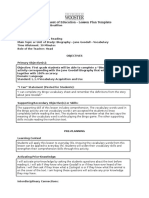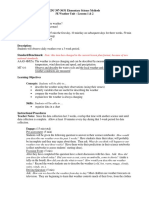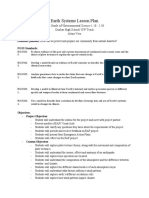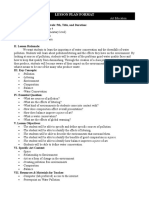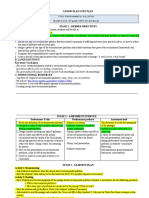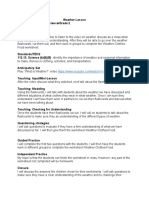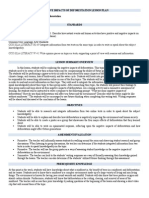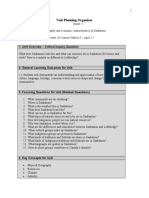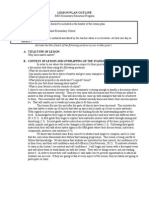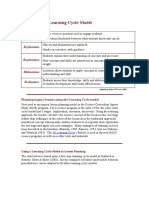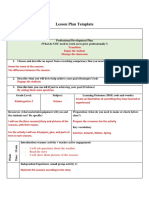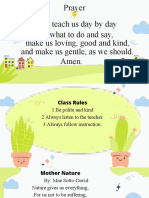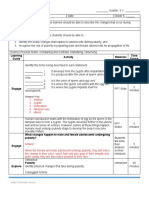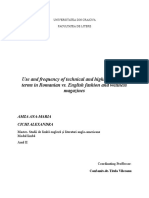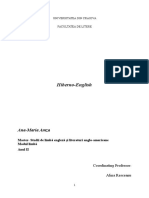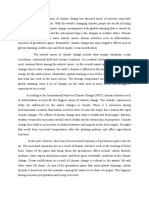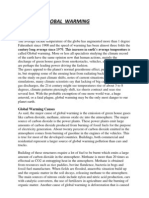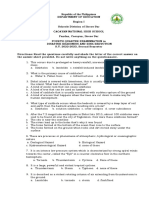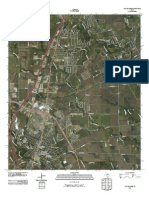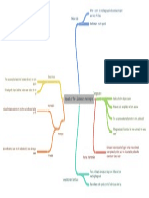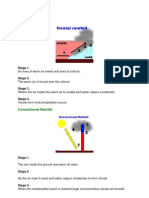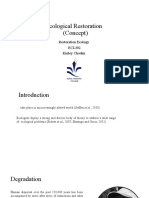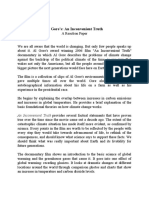Weather Lesson Plan
Weather Lesson Plan
Uploaded by
Ana-Maria GuguCopyright:
Available Formats
Weather Lesson Plan
Weather Lesson Plan
Uploaded by
Ana-Maria GuguCopyright
Available Formats
Share this document
Did you find this document useful?
Is this content inappropriate?
Copyright:
Available Formats
Weather Lesson Plan
Weather Lesson Plan
Uploaded by
Ana-Maria GuguCopyright:
Available Formats
TeachingEnglish | Lesson plans
The weather
Topic: The weather
Aims:
- To give students practice in reading for specific information in an online
article about the weather
- To practise pronunciation, word stress and collocations connected with the
weather
Level: Advanced
Introduction
The aim of this lesson is to give students practice in reading for specific
information in an online article about the weather. Students will also have an
opportunity to practise pronunciation, word stress and collocations connected with
the weather.
The plan is based around a text from the British Council LearnEnglish Central
website at: http://learnenglish.britishcouncil.org/en/magazine/weather
The webpage also has a variety of online interactive activities.
We have also included the text for students and teachers without Internet access
in class.
Procedure
Introduction task
As a lead-in to the topic, you could show students the BBC weather
website at http://www.bbc.co.uk/weather/world/ and look at the five-day
forecast for your area.
Elicit from students what the various symbols and words mean.
Alternatively use a weather map from a magazine or newspaper.
Pre-reading discussion
Worksheet A
Students should discuss in pairs or groups the difference between the
different weather phenomena.
Tip: photos or drawings of the various weather phenomenon will make comprehension checking
much easier as well as making the vocabulary more memorable for your students.
Pronunciation work
Worksheet B
Ask students in pairs to match the beginnings to the ends of the
phonemically spelt words.
www.teachingenglish.org.uk
BBC | British Council 2010
TeachingEnglish | Lesson plans
Write the phonemic next to the actual spelling and drill pronunciation.
Answers:
a
3
b
5
c
6
d
1
e
4
f
2
Vocabulary
Worksheet C
Ask students what adjectives we often use with rain and why, for example,
we say heavy rain and not strong rain. (Answer: because the words form
common collocations or word partnerships).
Ask students in pairs or groups to match the adjectives in column A to the
nouns in column B to form strong collocations. (Note: in some cases there
is more than one possibility).
Tip: If available, provide students with good monolingual dictionaries as these will often give
common collocations, sometimes with example sentences so that your students can see how the
words are used in context. Using a bilingual dictionary is not as helpful and often confusing as
collocations tend to differ between languages.
Suggested collocations:
torrential rain
flash floods
severe gales/weather conditions/storms/floods
dense fog
sunny spells/weather conditions
freak gales/weather conditions/storms/floods
violent gales/weather conditions/storms
high humidity
Pre-reading discussion
Worksheet D
Ask students to discuss the questions in pairs or groups. Monitor the
discussions closely so that you can ask students to bring up any interesting
points they raised in an open-class discussion afterwards.
Reading task
Show students the text about the weather from the website and give them
the reading comprehension questions (below) in Worksheet E. Ask them
to find the answers to the questions. If you have a computer room, you may
prefer them to read the article online at:
http://learnenglish.britishcouncil.org/en/magazine/weather
www.teachingenglish.org.uk
BBC | British Council 2010
TeachingEnglish | Lesson plans
Tip: The online article has a special function that you might like to make students aware of. If they
double-click on any word, a definition will appear in a separate box on the screen.
In class, elicit the answers to the questions.
Worksheet E
1. According to scientific studies, what effects can the weather have on people?
2. What causes changes in the weather in the British Isles?
3. According to some researchers, what effect has human activity in Europe and
North America had on Africa?
4. How can pine cones and seaweed help us predict the weather?
5. How reliable is technology in predicting the weather?
6. What did a recent study by an Australian psychologist suggest?
7. Whats the connection between weather and disease?
8. What are stormchasers
www.teachingenglish.org.uk
BBC | British Council 2010
TeachingEnglish | Lesson plans
Text
Weather
by Mike Rayner
It's hardly surprising that weather is a favourite topic for so many people around the world
it affects where we choose to live, what we wear, our moods, and perhaps even our
national characteristics. A sunny day can relieve the deepest depression, while extreme
weather can destroy homes and threaten lives.
The effects of weather
Palm trees bent double in hurricane force winds, cars stranded in snow drifts, people
navigating small boats down flooded city streets images we are all familiar with from
news reports of severe weather spells. But many of the effects of the weather are less
newsworthy.
Im feeling a bit under the weather is a common complaint in Britain, especially on
Monday mornings, and it seems that weather really can be responsible for moods.
Studies have shown that changeable weather can make it hard to concentrate, cloudy
skies slow down reflexes, and high humidity with hot, dry winds makes many people
irritable and snappy.
Some suggest that the weather also leaves its mark on character, giving people from the
same region similar temperaments, although it seems that economic, political and social
factors are likely to have a much stronger effect than the weather.
What causes changes in the weather?
If you live in a place like Britain, where the weather seems to change daily if not hourly,
you could be forgiven for thinking that the weather is random. In fact the weather is
controlled by systems which move around areas of the globe. In the UK the weather
depends on depressions, often called lows, and anticyclones, also known as highs.
These systems start in the Atlantic Ocean, and make their way across the British Isles
from the west to the east. Highs bring sunny weather, while lows bring rain and wind.
The weather systems in tropical climates are very different from those in mid and high
latitudes. Tropical storms develop from depressions, and often build into cyclones, violent
storms featuring hurricanes and torrential rain.
In modern times, human activity seems to be altering weather patterns. Gases produced
by heavy industry change the temperature of the Earths surface, and affect cloud
formation. Some researchers say that factories in Europe and North America may have
been one of the causes of the droughts in Africa in the 1980s.
Can we predict the weather?
The human race has always tried to guess the weather, especially in areas of the world
where there are frequent changes. Traditional rhymes point to early attempts to identify
weather patterns, popular poems include:
Red sky at night, shepherds delight; Red sky in the morning, shepherds warning
Ash leaf before the oak, then we will have a summer soak;
Oak leaf before the ash, the summer comes without a splash
Flies will swarm before a storm.
Rain before 7, clear by 11.
www.teachingenglish.org.uk
BBC | British Council 2010
TeachingEnglish | Lesson plans
Two other popular traditional ways of forecasting the weather used pine cones and
seaweed. When the air has a high level of humidity there is a higher chance of rain, when
the humidity is low, there is more chance of fine weather. Pine cones and seaweed react
to changes in humidity - pines cones open, and seaweed feels dry when the humidity is
low, while high humidity has the opposite effect.
While folk wisdom can still provide a guide to help forecast weather, todays methods of
prediction increasingly rely on technology. Satellites, balloons, ships, aircraft and weather
centres with sensitive monitoring equipment, send data to computers. The data is then
processed, and the weather predicted. However, even this system cannot predict weather
for longer than about week.
A recent study by an Australian psychologist suggests that certain people may have a
special gift for predicting the weather. However it is possible that these people would use
their talent in another way, since the same group had considerable success in forecasting
changes in another chaotic system the stock market.
It appears that a study of weather patterns may also enable scientists to predict the
outbreak of disease. An Ebola epidemic in Uganda in the year 2000 came after the same
rare weather conditions that had been present before an outbreak 6 years earlier. Efforts
to limit the spread of airborne diseases such as foot and mouth, are also strongly
dependent on favourable wind conditions.
Extreme weather
Although people in Britain often moan about the weather, we should spare a thought for
the inhabitants of parts of the world where extreme weather regularly wreaks havoc on
the environment and population. Sandstorms, tornadoes, blizzards and flash floods
regularly kill thousands of people and leave many others homeless.
While most of us try to avoid extreme weather, some adventurous souls actively seek out
places where extreme weather conditions exist. Sports such as surfing, kiteboarding, iceclimbing and white-water rafting are becoming increasingly popular with people seeking
relief from the monotony of daily routine. Extreme sports are about exhilaration, skill and
danger, and often harness the weather to provide adrenaline addicts with their kicks.
Even more extraordinary are storm-chasers weather enthusiasts who risk their lives
following tornadoes and thunderstorms at high speed to witness the damage they cause
at close hand.
Discussion task
In pairs, ask students to discuss the following questions:
Had you heard of any of the ideas in the article before?
Are there any parts of the article that you agree or disagree with? Why?
Have you ever experienced any extreme weather conditions? Where were
you and what was it like?
Follow-up
If your students have Internet access, ask them to search the net for any
stories about extreme weather conditions and report back to the class.
www.teachingenglish.org.uk
BBC | British Council 2010
You might also like
- Elp Pushing Out Pollution Lampkins and ImpellizzeriDocument5 pagesElp Pushing Out Pollution Lampkins and Impellizzeriapi-242604347No ratings yet
- III Unit 4a at The ToyshopDocument3 pagesIII Unit 4a at The ToyshopAna-Maria Gugu100% (1)
- My SchoolbagDocument3 pagesMy SchoolbagAna-Maria Gugu100% (2)
- Activity Sheet On TyphoonDocument4 pagesActivity Sheet On TyphoonArgyll Paguibitan100% (9)
- Key Quotes Analysis - Cell OneDocument1 pageKey Quotes Analysis - Cell OneTamish agarwalNo ratings yet
- Lesson Plan Seasons First LessonDocument6 pagesLesson Plan Seasons First Lessonapi-248586362No ratings yet
- K Science - Weather Lesson PlanDocument3 pagesK Science - Weather Lesson Planapi-570789490No ratings yet
- Jane Goodall Lesson PlanDocument6 pagesJane Goodall Lesson PlanRylee BouillionNo ratings yet
- Edtpa Lesson Plan-2Document3 pagesEdtpa Lesson Plan-2api-257917558No ratings yet
- Geotechnical Engineering Practice For Collapsible SoilsDocument2 pagesGeotechnical Engineering Practice For Collapsible SoilsGavisita Sotelo Camones50% (2)
- Health Lesson 1Document7 pagesHealth Lesson 1Via Mae VirtousaNo ratings yet
- Mental Health - Lesson 1Document2 pagesMental Health - Lesson 1cdorsett20No ratings yet
- Ted 513 - Health Lesson PlanDocument2 pagesTed 513 - Health Lesson Planapi-483896389No ratings yet
- Health Lesson Plan-TrbDocument4 pagesHealth Lesson Plan-Trbapi-316161164100% (1)
- 12 Weather Lesson PlanDocument6 pages12 Weather Lesson PlanRicardo BasurtoNo ratings yet
- Weather 5e Unit Lesson PlansDocument11 pagesWeather 5e Unit Lesson PlansNeha SharmaNo ratings yet
- Lesson Plan Weather DisturbancesDocument5 pagesLesson Plan Weather DisturbancesJay ContadoNo ratings yet
- Lesson Plan - PredictDocument5 pagesLesson Plan - Predictapi-338595937100% (1)
- Literacy Center OutlineDocument2 pagesLiteracy Center Outlineapi-287053441No ratings yet
- Proper Nouns - Days of The WeekDocument1 pageProper Nouns - Days of The Weekapi-366622089No ratings yet
- Earth Systems Lesson PlanDocument11 pagesEarth Systems Lesson Planapi-526717809No ratings yet
- Siop Cloud Lesson PlanDocument6 pagesSiop Cloud Lesson Planapi-339701702100% (1)
- Seton Hill University Lesson Plan Template: Name Subject Grade Level Date/DurationDocument4 pagesSeton Hill University Lesson Plan Template: Name Subject Grade Level Date/Durationapi-299952808No ratings yet
- Lesson PlanDocument3 pagesLesson PlanellenNo ratings yet
- The Revised Online Methodology: The Adults' Department Fall 2022Document69 pagesThe Revised Online Methodology: The Adults' Department Fall 2022kamal veysipoorNo ratings yet
- Lesson Plan ClothesDocument5 pagesLesson Plan Clothesapi-295576641No ratings yet
- Lesson Plan Format: I. Lesson Number, Grade Levels: 5th, Title, and DurationDocument6 pagesLesson Plan Format: I. Lesson Number, Grade Levels: 5th, Title, and Durationapi-318160046No ratings yet
- Pollution LessonDocument4 pagesPollution Lessonapi-2834042340% (1)
- Animals and Plant in The DesertDocument4 pagesAnimals and Plant in The DesertShamsa AlshNo ratings yet
- Detailed LessonplanDocument9 pagesDetailed LessonplanJelly Ann De ChavezNo ratings yet
- Environmental AwarenessDocument13 pagesEnvironmental Awarenessapi-550142766No ratings yet
- Week 15 Environmental Science Pollution and Its FactorsDocument22 pagesWeek 15 Environmental Science Pollution and Its FactorsReine Jholo BagaipoNo ratings yet
- Lesson Plan 1 - 1Document2 pagesLesson Plan 1 - 1api-330880610No ratings yet
- 3.4. Handout 3 - UbD Sample - Environmental Pollution (3 Stages) FINAL 2.2021Document13 pages3.4. Handout 3 - UbD Sample - Environmental Pollution (3 Stages) FINAL 2.2021Trinh Doan100% (1)
- Science Nov 26-30Document7 pagesScience Nov 26-30Cher AnascoNo ratings yet
- Weather Lesson 2nd GradeDocument2 pagesWeather Lesson 2nd Gradeapi-535070811No ratings yet
- Tornadoes Lesson PlanDocument14 pagesTornadoes Lesson PlanSharrel RigtersNo ratings yet
- Lesson PlansDocument4 pagesLesson PlansStoean CristinaNo ratings yet
- Negative Impacts of Deforestaion LessonDocument6 pagesNegative Impacts of Deforestaion Lessonapi-250695989No ratings yet
- Social Studies Prairie Unit PlanDocument54 pagesSocial Studies Prairie Unit Planapi-528612841No ratings yet
- LESSONPLAN For RankingDocument4 pagesLESSONPLAN For RankingJuchiel RobesNo ratings yet
- Weather InstrumentsDocument13 pagesWeather Instrumentsapi-500320438No ratings yet
- Environmental Lesson Plan - DifferentiatedDocument6 pagesEnvironmental Lesson Plan - Differentiatedapi-352851812No ratings yet
- Natural Lesson PlanDocument4 pagesNatural Lesson Planapi-300889911No ratings yet
- Art - Integrated Lesson Plan Final ProjectDocument3 pagesArt - Integrated Lesson Plan Final Projectapi-2733048950% (1)
- Lesson PlanDocument4 pagesLesson PlanKhánh Linh Phan100% (1)
- Life Science Lesson Plan William Sanchez 1Document20 pagesLife Science Lesson Plan William Sanchez 1api-384371910100% (1)
- Final Science Lesson Plan and ReflectionDocument13 pagesFinal Science Lesson Plan and Reflectionapi-27024195667% (3)
- Lesson Plan Visual ArtsDocument8 pagesLesson Plan Visual Artsapi-486388549No ratings yet
- Lessonplan PhotosynthesisDocument7 pagesLessonplan Photosynthesisapi-287882801100% (1)
- Earth Science Lesson Plan For Inner and Outer PlanetsDocument4 pagesEarth Science Lesson Plan For Inner and Outer PlanetslarissaNo ratings yet
- The 5 e Learning Cycle ModelDocument4 pagesThe 5 e Learning Cycle ModelMelvin Pomare BernardNo ratings yet
- Landforms Lesson PlanDocument5 pagesLandforms Lesson Planapi-251165550No ratings yet
- A Detailed Lesson Plan in Grade 4 DemoDocument7 pagesA Detailed Lesson Plan in Grade 4 DemoCindy Pableo SantosNo ratings yet
- Scince LitracyDocument3 pagesScince Litracyapi-307983330No ratings yet
- Lesson 1 Weather and ClimateDocument4 pagesLesson 1 Weather and Climateapi-394957459No ratings yet
- Holiday Homework I To XDocument30 pagesHoliday Homework I To XPalak Singhal100% (1)
- Detailed Lesson Plan (DLP) I. ObjectivesDocument12 pagesDetailed Lesson Plan (DLP) I. ObjectivesEugene Buenavente AzorNo ratings yet
- DLL Science2Document3 pagesDLL Science2Vahne Tacuyo NolloraNo ratings yet
- DEMO 2022 1st COTDocument31 pagesDEMO 2022 1st COTMae Sotto David100% (1)
- ST Grade 5 PUBERTY-LPDocument5 pagesST Grade 5 PUBERTY-LPGrace MarquezNo ratings yet
- Mould Lesson PlanDocument3 pagesMould Lesson Planapi-297200258No ratings yet
- Teacher's Reflection FormDocument11 pagesTeacher's Reflection FormIvy AnteNo ratings yet
- Weather Plan (Advanced)Document6 pagesWeather Plan (Advanced)Nadir BaghdadNo ratings yet
- Barem Scris OLE 1 03 2014 Cls 7 Pagina OLEDocument1 pageBarem Scris OLE 1 03 2014 Cls 7 Pagina OLEAna-Maria GuguNo ratings yet
- Numeralul 1. Numeralul CardinalDocument2 pagesNumeralul 1. Numeralul CardinalAna-Maria GuguNo ratings yet
- Bilingv 4Document3 pagesBilingv 4Ana-Maria GuguNo ratings yet
- GenderDocument2 pagesGenderAna-Maria Gugu50% (2)
- Speed Dating: Three Well Did ToDocument2 pagesSpeed Dating: Three Well Did ToAna-Maria Gugu50% (2)
- Irregular VerbsDocument3 pagesIrregular VerbsAna-Maria GuguNo ratings yet
- Referat Corpus LingDocument13 pagesReferat Corpus LingAna-Maria GuguNo ratings yet
- VIII Inspectie 1Document1 pageVIII Inspectie 1Ana-Maria GuguNo ratings yet
- III Unit 3a My FamilyDocument4 pagesIII Unit 3a My FamilyAna-Maria Gugu100% (2)
- III Unit 5c Where's AlvinDocument3 pagesIII Unit 5c Where's AlvinAna-Maria GuguNo ratings yet
- Lesson Plan Internet AddictionDocument4 pagesLesson Plan Internet AddictionAna-Maria Gugu100% (1)
- English in IrelandDocument6 pagesEnglish in IrelandAna-Maria GuguNo ratings yet
- Planificare Pe Unită I de Învă Are Ț Ț AN COLAR 2015-2016 Ș Comunicare În Limba EnglezăDocument15 pagesPlanificare Pe Unită I de Învă Are Ț Ț AN COLAR 2015-2016 Ș Comunicare În Limba EnglezăAna-Maria GuguNo ratings yet
- Tematica EnglezaDocument75 pagesTematica EnglezaAna-Maria GuguNo ratings yet
- Anggita Arief Febriandia (056) Ekologi QDocument4 pagesAnggita Arief Febriandia (056) Ekologi QAnggita Arief FebriandiaNo ratings yet
- WaterDocument4 pagesWaterMeher Azeem HakroNo ratings yet
- Cause and Effect of Climate ChangeDocument2 pagesCause and Effect of Climate ChangeBzy BissNo ratings yet
- JK Geography CompiledDocument113 pagesJK Geography Compiledsandeep kumarNo ratings yet
- Iahs 242 0017Document5 pagesIahs 242 0017mihominnNo ratings yet
- Learning Activity 3 / Actividad de Aprendizaje 3 Evidence: I Can't Believe It! / Evidencia: ¡No Puedo Creerlo!Document3 pagesLearning Activity 3 / Actividad de Aprendizaje 3 Evidence: I Can't Believe It! / Evidencia: ¡No Puedo Creerlo!Lady Johana Puerta NaranjoNo ratings yet
- Global WarmingDocument18 pagesGlobal WarmingSharanya MuraliNo ratings yet
- DRRR q4 ExaminationDocument5 pagesDRRR q4 ExaminationLAURENCE CASILDO100% (1)
- Social Studies Standard FourDocument150 pagesSocial Studies Standard Fourinfo.journeythroughNo ratings yet
- Topographic Map of WaxahachieDocument1 pageTopographic Map of WaxahachieHistoricalMaps100% (1)
- Basic Concept of Hazard: Disaster Risk Reduction and ReadinessDocument14 pagesBasic Concept of Hazard: Disaster Risk Reduction and ReadinessChristine ApoloNo ratings yet
- A Riot of Hidden Life in The Arctic After Dark: FeatureDocument4 pagesA Riot of Hidden Life in The Arctic After Dark: Featurechato law officeNo ratings yet
- 6 Factors of River RegimeDocument1 page6 Factors of River RegimeQasim IbrahimNo ratings yet
- Quiz5 Basico 4Document8 pagesQuiz5 Basico 4zuly.zambranoNo ratings yet
- Reviewer in Earth ScienceDocument4 pagesReviewer in Earth ScienceMhariane MabborangNo ratings yet
- GEN 013 Day 15 SASDocument4 pagesGEN 013 Day 15 SASkeme.custodio.upNo ratings yet
- DRRRDocument16 pagesDRRRAlexa Feliz De PedroNo ratings yet
- Physical Features of IndiaDocument5 pagesPhysical Features of IndiaTapas BanerjeeNo ratings yet
- Frontal RainfallDocument3 pagesFrontal RainfallFatin AnisahNo ratings yet
- Toposheet Symbols & Pics For Class 10Document68 pagesToposheet Symbols & Pics For Class 10TRIJAL SRIMAL33% (3)
- CV Sanjay JainDocument37 pagesCV Sanjay JainKumardeep MukhopadhyayNo ratings yet
- Ecological Restoration (Concept)Document35 pagesEcological Restoration (Concept)Rohan BiswaNo ratings yet
- Anti-Sedimentation Systems For Marinas and Yacht Harbours (2015)Document83 pagesAnti-Sedimentation Systems For Marinas and Yacht Harbours (2015)Ermal SpahiuNo ratings yet
- Glenans LogbookDocument11 pagesGlenans LogbookkhaireddinNo ratings yet
- BscsDocument1 pageBscsPaolo BraseyNo ratings yet
- L1 Introduction To MountaineeringDocument5 pagesL1 Introduction To MountaineeringKenneth John Lloyd OrtizNo ratings yet
- An Inconvenient Truth Reaction PaperDocument3 pagesAn Inconvenient Truth Reaction PaperJawehNo ratings yet
- Diagnostic Test Basic 4Document3 pagesDiagnostic Test Basic 4LaksmyNo ratings yet







